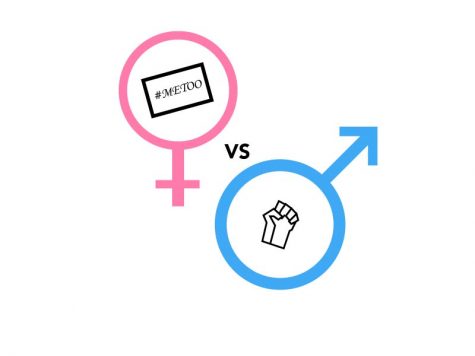‘Sex Education’ arrives on the issue of toxic masculinity
January 23, 2020
Toxic masculinity: a phrase widely misused and consequently viewed as a fictitious radical idea. However, toxic masculinity does indeed exist, just as toxic femininity. The discussion of these issues is vital, and the unpacking of their detrimental consequences could create a better world.
Toxic femininity often entails diet culture, pitting women against other women, equating self-worth with beauty and internalized misogyny. On the other hand, toxic masculinity includes the glamorization of violence, teaching boys to suppress all emotions except anger, linking sexual activity to masculinity and demonizing the male exhibition of “feminine traits.” Both types of gender toxicity pejoratively affect those impacted, but toxic masculinity is far more widespread and dangerous than toxic femininity, mostly due to our patriarchal society.
It was the Netflix show “Sex Education” that got me thinking more about toxic masculinity. The show centers around the coming of age of a teenage boy, delving deep into modern issues, especially sex and gender issues.
The second season of the series recently came out on Jan. 17, and the parallels between male characters in their expression (or lack thereof) of emotion create a jarring contrast. The show’s overall theme focuses on revealing cultural taboos, including toxic masculinity.
The painfully awkward main character, Otis Milburn (Asa Butterfield) struggles to communicate his feelings throughout all of season one and two, and his impaired emotional maturity is linked to his difficulty understanding and expressing his gender. Cultural constructs and prejudiced conventions skew his understanding of what manhood actually is, and the pressure put on Otis to be sexually active impacts him in an extremely negative way.
Otis feels as if his manhood is directly connected to his sexual prowess, while the women in the series are encouraged to hide or suppress any romantic experiences. The presumed and accepted promiscuity of men compared to the barred and unaccepted promiscuity of women is illustrated well through this series, exposing the inherent bias that we internalize about gender.

Toxic masculinity has become a prominent issue in today’s society.
His best friend Eric Eoffing (Ncuti Gatwa) suffers from a different problem regarding his expected gender expression. Eric attempts to accept his sexuality in a heavily homophobic environment, representing millions of men in the same situation. He feels as if his manhood is not as legitimate as those around him because he is gay. Both main male characters struggle to express their feelings in a world that constantly invalidates said feelings, and their immense pain in finding themselves through a contrived filter of stereotyped gender characteristics affected me, for I pitied them. I have always realized the prevalence of toxic masculinity in our culture, but the immense weight and impact of its presence had never really dawned on me before this show. I suppose that I chose to recognize its existence but ignore its effects because of how scary the reality of its effects truly is.
However, the true reality is that toxic masculinity is more than scary, it’s destructive. Toxic masculinity often entails encouraging men to suppress their emotions, to “man up,” and to be hyper-masculine even if it isn’t their personality. Oftentimes, the only emotion that is deemed acceptable is anger, because sadness and melancholy are seen as “weak” or “gay.” This can often lead to violence, as illustrated by the countless studies surrounding the issue. For example, 92.9% of prison inmates in the US as of Jan. 11, 2020, are men. The gender disparity is indicative of the culture of violence that is widely prevalent.
Consider the statistic that men are culpable for the large majority of violent crimes. Statista.com reports that, “Since 1982, an astonishing 111 mass shootings have been carried out in the United States by male shooters. In contrast, only three mass shootings (defined by the source as a single attack in a public place in which four or more victims were killed) have been carried out by women.” This theme of encouraging violence was portrayed in “Sex Education,” as many of the characters view brutality as a means of resolution, or as an outlet for anger. This theme is realistic, for its prevalence in the real world is just as terrifying at is in the show.
The most frightening study surrounding toxic masculinity is the one pointing to the fact that it can take lives. According to Forbes, “In just about every country, men commit suicide more frequently than women, which is intriguing since women typically have higher (at least, reported) rates of mental health disorders like depression.”
Psychologists theorize that women turn to others in times of need, while men feel ashamed when doing so. Seeking help and employing emotional vulnerability is in no way a sign of weakness, but rather a sign of strength, yet many men still feel as if it isn’t due to societal influences and enforced gender stereotypes. The constant pressure to be “man enough” creates an emotional wall that is difficult to crack. There is a definite correlation between unhealthy and problematic behavior and designated gender. Toxic masculinity kills, and it’s time we own up to it.
Men do not need to be “tougher,” they do not need to “man-up” and they do not need to hide their emotions. They just need to be them. The open expression of emotion and repulsion of gender roles creates a healthy mind and a healthy life. There should not be an unhealthy standard of manhood in our society, for a man enters manhood the moment he decides to. In the words of Jackson from “Sex Education,” “You’ve gotta let me figure out who I am and what else I like to do on my own.”











